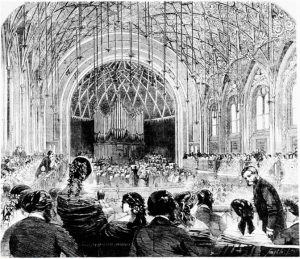The Glasgow Select Choir in St James’s Hall, London, on St Andrew’s Day, Tuesday the 30th of November, 1880
The Interior of St James’s Hall, London, in 1858.
On Wednesday the 1st of December, 1880, The Glasgow Herald published a communication from its London correspondent, on page five. Headed “THE GLASGOW SELECT CHOIR IN LONDON”, it reads:
“The first appearance in London of the Glasgow Select Choir took place at St James’s Hall to-night before an audience in which the
Scottish element prevailed, and which crowded the hall to the very doors. For some time past the Glasgow Select Choir had desired
to submit their charms to the test of a London appearance, and after considerable negotiation the opportunity was afforded by the
popular London impresario Mr Ambrose Austin. The Select Choir to-night mustered twenty-four voices, one of the tenors, who was
indisposed, being replaced by an extra vocalist. The indisposition of Mr Edward Lloyd gave the choir a further opportunity of a
hearing, and their offer to sing part-songs to compensate for the disappointment was cheerfully accepted. They were heard in music
which was representative of nearly every branch of their repertory. The first number of the programme, Scott’s “Hail to the Chief,”
was promptly encored, and a similar fate befell almost every piece that the choir sang. “The Laird o’ Cockpen,” newly harmonised for
the London concert by Mr Allan Macbeth; “Up in the Morning Early,” arranged by Mr Hume of Glasgow; “Willie Wastle” (substituted
by desire for “O a’ the Airts”), and the Tramp Chorus from Bishop’s “Rob Roy” were all encored. The Jacobite melody “Waes me for Prince
Charlie,” and “Ye Banks and Braes,” would have received a similar compliment had not Mr James Allan, the conductor, judiciously
proceeded with the programme; while “Auld Lang Syne” was received by the audience upstanding, the galleries, according to custom,
joining in the refrain. Perhaps one of the best items of the programme was Burns’s “O, Willie Brewed a Peck o’ Maut,” so charmingly
sung by three members of the choir (Messrs Gilchrist, Kay, and Duncan) that its repetition was unavoidable. Criticism of the Glasgow
Select Choir in a Glasgow newspaper would be superfluous, and it need only be said that, apart from the lavish and almost wild applause
of the audience, the choir, thanks to its admirable balance, the delicacy of its shading, and the hearty unanimity with which the members
worked with Mr Allan, the conductor, gained sincere praise from many London musicians and music lovers who were present. The rest of the
programme was composed of Scottish songs sung by Mdme. Patey, Miss Thorndike, Messrs Sims Reeves, Herbert Reeves, Santley, and
Clifford. A special word of praise is due to Miss Agnes Ross, a native of Campsie, who sang “We’re a’ Noddin’ ” so well that it was
unanimously encored.”

